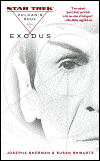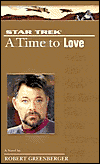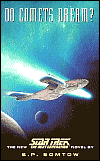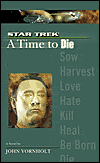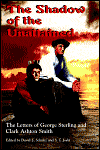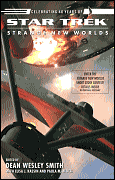
Strange New Worlds IX, edited by Dean Smith Wesley
Book Review by David Roy
Have you read this book?
Star Trek: Strange New Worlds 9 is this year's edition of the annual short story collection by fans, for fans, edited by Dean Wesley Smith, Elisa J. Kassin, and Paula M. Block. Authors who submit stories must have had only two or less professional sales, and it's interesting watching the discussion of this series on the various Trek Internet boards, with fans talking about the stories they're submitting. This year's collection showcases some previously seen authors (a couple of whom fulfill the third sale criteria to be disqualified from next year's edition. Others are new, or at least new to me. One thing I can say, though, is that the quality of these stories is nowhere near what it was last year. Some of the stories held my interest, but only a couple of them besides the award winners (all of which I agree with this year) really grabbed me and said "I'm glad I read this." A couple of them seemed pointless to me, and the rest of them just made it to the point where I didn't feel like I had wasted my time. It's unfortunate, as this is the first in the three that I've read where this has been the case.
The stories are divided by the television series they are attached to, with another section called "Speculations." These are stories that are too broad to be tied to just one of the series. These "Speculations" can either be stories that span the timeframe of more than one series (no real examples this time around) or they could incorporate elements from more than one series ("Rocket Man" has Kirk being brought back after his death in Generations by Gary Seven's organization, on a mission to stop the Duras family from creating a weapon that would destroy the Klingon Empire). This year's edition has something new in this category, though (or at least new to me), and that is stories that take place in a timeframe before any of the Trek series, incorporating Trek history without any of the characters. "The Rules of War" takes place during the Eugenics Wars and while its main character is ostensibly a relative of Captain Archer's (Nathan Archer, but I can't remember if that name is canonical or not).
This year's third prize winner is well-deserved. "Mestral," by Ben Guilfoy, comes from the Enterprise section of stories, but it isn't really about any of the characters. A Vulcan named Mestral, who stayed on Earth following a Vulcan crash landing here in the 1950s, has now lived to see humanity almost destroy itself, with huge coalitions going to war against each other, nuclear exchanges, and devastation everywhere. Scavengers are everywhere, but Mestral meets somebody else in the technology labs at MIT. A man with a vision of a power source that could fuel exploration, or weapons capable of destroying everything if they fall into the wrong hands. The man calls himself "Zee," and he's come there to die. But Mestral can't let that happen, no matter what Zee thinks. They begin a cross country trek to the wilds of Montana, someplace where maybe this design can become humanity's savior. I loved this story, taking a rather silly Enterprise episode and tying it into one of the most important pieces of Trek history. Guilfoy delivers wonderful characterization, and the friendship (if you can call it that, as Mestral has to hide a lot from Zee) that develops between them is very well done. Guilfoy's prose is excellent as well, making me care about them and what happens to them. This is an excellent story.
The second prize winner is "Choices," by Susan S. McCrackin. This is a Voyager story, where the Doctor and Seven of Nine crash land on a planet with pre-warp capabilities. Seven wakes up in a hospital, being treated by Doctor Gretkora, a kindly man who has disabilities of his own and knows exactly what Seven's going through. She's paralyzed, and without any hope, until she remembers who she is and about her companion. Gretkora takes such good care of her that she wants to do something for him once Janeway and Voyager come to their rescue, but the choices that we make are colored by our beliefs and our place in society. She and the Doctor offer Gretkora a life renewed, but they don't realize how much it might cost him. One thing that I really loved about this story is that it starts out making you think of one kind of story (our heroes are on a primitive planet, interrogated by the local military, and have to try and escape without showing off their technology too much) and turns it into an emotional wringer story about the choices we make and how they can affect us. McCrackin captures the characters perfectly, especially Seven. I loved the scene where she begins crying, something that she's never done before, and has to allow Gretkora to help her blow her nose. The emotions are extremely well-done. For turning our expectations on their heads, as well as giving us a great character piece for Seven *and* Gretkora, McCrackin definitely deserves second prize.
The grand prize winner is "Orphans," by R.S. Belcher. Fittingly, it's also the last story in the book. This is a wonderful story combining elements of TNG and DS9, involving the genetically-enhanced super-soldiers from Angosia (from the TNG episode "The Hunted") being recruited by Dr. Bashir and Admiral Pressman for a mission from Section 31. The Dominion has captured a planet with a unique device discovered during Kirk's time, and while Section 31 would like to keep the device for itself, they certainly can't let it fall into Dominion hands. Dr. Bashir has his own thoughts on whether Section 31 should have it or not as well, given his already well-documented antipathy toward the organization. This is definitely an effective piece tying together many aspects of the Trek universe. It's interesting to contrast Dr. Bashir's illegal genetic enhancement with the Angosian soldiers', as Bashir's was done just to improve him generally while the soldiers' enhancement was to make them the perfect killing machines. It's also interesting to discover that Bashir was involved in creating the drug that effectively numbed their minds so that they weren't a danger to the populace any longer. Belcher does a good job with the characterizations and arguments between all of the people involved, but he also throws in some interesting stuff regarding the device involved and the various factions who want to make use of it. It definitely earns its grand prize, and kudos to Belcher, who makes his first professional sale with this one.
Most of the rest of the stories are ok, but too many of them go "outside the box" of the series in question, rather than telling us an interesting story using those characters. The TOS stories, for example, either involve peripheral elements introduced in that series (the Kelvans, for example) or move beyond the time frame (a story with Spock and T'Pring from immediately after Kirk has died). While they might be interesting, none of them really rise to the level of grabbing the reader.
There are a few exceptions though. "Terra Tonight", while a very simple story of Scotty helping a young cadet save her ship from a horrible temporal anomaly while Scotty is being interviewed on live television (or whatever it's called in the future) captures Scotty perfectly and is dedicated to James Doohan. I think Doohan would have loved it. And the Ferengi fable story is also fun, though it does break one of the contest rules by seeming to incorporate novel continuity (they are supposed to stick to "canon" sources of the movies and television shows) by having Quark and Ro romantically involved on DS9. It's still a fun little story though.
All in all, the stories in this volume just generally didn't do much for me. It's a shame, as generally Smith picks very strong stories, but this time, with a few exceptions, I don't think he did. That being said, it's all a matter of taste, and this year's edition doesn't seem to fit my taste at all. It's definitely worth a read for a few of the stories, though, and most of the rest are certainly ok. Just nothing noteworthy.
As usual, I will list the stories below: TOS
"Gone Native" by John Coffren
"A Bad Day for Koloth" by David DeLee
"Book of Fulfillment" by Steven Costa
"The Smallest Choices" by Jeremy Yoder
TNG
"Staying the Course" by Paul C. Tseng
"Home Soil" by Jim Johnson
"Terra Tonight" by Scott Pearson
"Solace in Bloom" by Jeff D. Jaques
DS9
"Shadowed Allies" by Emily P. Bloch
"Living on the Edge of Existence" by Gerri Leen
"The Last Tree on Ferenginar: A Ferengi Fable From the Future" by Mike McDevitt
"The Tribbles' Pagh" by Ryan M. Williams
Voyager
"Choices" by Susan S. McCrackin (Second Prize)
"Unconventional Cures" by Russ Crossley
"Maturation" by Catherine E. Pike
Enterprise
"Rounding a Corner Already Turned" by Allison Cain
"Mother Nature's Little Reminders" by A. Rhea King
"Mestral" by Ben Guilfoy (Third Prize)
Speculations
"Remembering the Future" by Randy Tatano
"Rocket Man" by Kenneth E. Carper
"The Rules of War" by Kevin Lauderdale
"The Immortality Blues" by Marc Carlson
"Orphans" by R.S. Belcher (Grand Prize)
The stories are divided by the television series they are attached to, with another section called "Speculations." These are stories that are too broad to be tied to just one of the series. These "Speculations" can either be stories that span the timeframe of more than one series (no real examples this time around) or they could incorporate elements from more than one series ("Rocket Man" has Kirk being brought back after his death in Generations by Gary Seven's organization, on a mission to stop the Duras family from creating a weapon that would destroy the Klingon Empire). This year's edition has something new in this category, though (or at least new to me), and that is stories that take place in a timeframe before any of the Trek series, incorporating Trek history without any of the characters. "The Rules of War" takes place during the Eugenics Wars and while its main character is ostensibly a relative of Captain Archer's (Nathan Archer, but I can't remember if that name is canonical or not).
This year's third prize winner is well-deserved. "Mestral," by Ben Guilfoy, comes from the Enterprise section of stories, but it isn't really about any of the characters. A Vulcan named Mestral, who stayed on Earth following a Vulcan crash landing here in the 1950s, has now lived to see humanity almost destroy itself, with huge coalitions going to war against each other, nuclear exchanges, and devastation everywhere. Scavengers are everywhere, but Mestral meets somebody else in the technology labs at MIT. A man with a vision of a power source that could fuel exploration, or weapons capable of destroying everything if they fall into the wrong hands. The man calls himself "Zee," and he's come there to die. But Mestral can't let that happen, no matter what Zee thinks. They begin a cross country trek to the wilds of Montana, someplace where maybe this design can become humanity's savior. I loved this story, taking a rather silly Enterprise episode and tying it into one of the most important pieces of Trek history. Guilfoy delivers wonderful characterization, and the friendship (if you can call it that, as Mestral has to hide a lot from Zee) that develops between them is very well done. Guilfoy's prose is excellent as well, making me care about them and what happens to them. This is an excellent story.
The second prize winner is "Choices," by Susan S. McCrackin. This is a Voyager story, where the Doctor and Seven of Nine crash land on a planet with pre-warp capabilities. Seven wakes up in a hospital, being treated by Doctor Gretkora, a kindly man who has disabilities of his own and knows exactly what Seven's going through. She's paralyzed, and without any hope, until she remembers who she is and about her companion. Gretkora takes such good care of her that she wants to do something for him once Janeway and Voyager come to their rescue, but the choices that we make are colored by our beliefs and our place in society. She and the Doctor offer Gretkora a life renewed, but they don't realize how much it might cost him. One thing that I really loved about this story is that it starts out making you think of one kind of story (our heroes are on a primitive planet, interrogated by the local military, and have to try and escape without showing off their technology too much) and turns it into an emotional wringer story about the choices we make and how they can affect us. McCrackin captures the characters perfectly, especially Seven. I loved the scene where she begins crying, something that she's never done before, and has to allow Gretkora to help her blow her nose. The emotions are extremely well-done. For turning our expectations on their heads, as well as giving us a great character piece for Seven *and* Gretkora, McCrackin definitely deserves second prize.
The grand prize winner is "Orphans," by R.S. Belcher. Fittingly, it's also the last story in the book. This is a wonderful story combining elements of TNG and DS9, involving the genetically-enhanced super-soldiers from Angosia (from the TNG episode "The Hunted") being recruited by Dr. Bashir and Admiral Pressman for a mission from Section 31. The Dominion has captured a planet with a unique device discovered during Kirk's time, and while Section 31 would like to keep the device for itself, they certainly can't let it fall into Dominion hands. Dr. Bashir has his own thoughts on whether Section 31 should have it or not as well, given his already well-documented antipathy toward the organization. This is definitely an effective piece tying together many aspects of the Trek universe. It's interesting to contrast Dr. Bashir's illegal genetic enhancement with the Angosian soldiers', as Bashir's was done just to improve him generally while the soldiers' enhancement was to make them the perfect killing machines. It's also interesting to discover that Bashir was involved in creating the drug that effectively numbed their minds so that they weren't a danger to the populace any longer. Belcher does a good job with the characterizations and arguments between all of the people involved, but he also throws in some interesting stuff regarding the device involved and the various factions who want to make use of it. It definitely earns its grand prize, and kudos to Belcher, who makes his first professional sale with this one.
Most of the rest of the stories are ok, but too many of them go "outside the box" of the series in question, rather than telling us an interesting story using those characters. The TOS stories, for example, either involve peripheral elements introduced in that series (the Kelvans, for example) or move beyond the time frame (a story with Spock and T'Pring from immediately after Kirk has died). While they might be interesting, none of them really rise to the level of grabbing the reader.
There are a few exceptions though. "Terra Tonight", while a very simple story of Scotty helping a young cadet save her ship from a horrible temporal anomaly while Scotty is being interviewed on live television (or whatever it's called in the future) captures Scotty perfectly and is dedicated to James Doohan. I think Doohan would have loved it. And the Ferengi fable story is also fun, though it does break one of the contest rules by seeming to incorporate novel continuity (they are supposed to stick to "canon" sources of the movies and television shows) by having Quark and Ro romantically involved on DS9. It's still a fun little story though.
All in all, the stories in this volume just generally didn't do much for me. It's a shame, as generally Smith picks very strong stories, but this time, with a few exceptions, I don't think he did. That being said, it's all a matter of taste, and this year's edition doesn't seem to fit my taste at all. It's definitely worth a read for a few of the stories, though, and most of the rest are certainly ok. Just nothing noteworthy.
As usual, I will list the stories below: TOS
"Gone Native" by John Coffren
"A Bad Day for Koloth" by David DeLee
"Book of Fulfillment" by Steven Costa
"The Smallest Choices" by Jeremy Yoder
TNG
"Staying the Course" by Paul C. Tseng
"Home Soil" by Jim Johnson
"Terra Tonight" by Scott Pearson
"Solace in Bloom" by Jeff D. Jaques
DS9
"Shadowed Allies" by Emily P. Bloch
"Living on the Edge of Existence" by Gerri Leen
"The Last Tree on Ferenginar: A Ferengi Fable From the Future" by Mike McDevitt
"The Tribbles' Pagh" by Ryan M. Williams
Voyager
"Choices" by Susan S. McCrackin (Second Prize)
"Unconventional Cures" by Russ Crossley
"Maturation" by Catherine E. Pike
Enterprise
"Rounding a Corner Already Turned" by Allison Cain
"Mother Nature's Little Reminders" by A. Rhea King
"Mestral" by Ben Guilfoy (Third Prize)
Speculations
"Remembering the Future" by Randy Tatano
"Rocket Man" by Kenneth E. Carper
"The Rules of War" by Kevin Lauderdale
"The Immortality Blues" by Marc Carlson
"Orphans" by R.S. Belcher (Grand Prize)
|
Click here to buy Strange New Worlds IX, edited by Dean Smith Wesley on Amazon
|
Strange New Worlds IX, edited by Dean Smith Wesley on Amazon

| More Books You Might Like |
Comment on Strange New Worlds IX, edited by Dean Smith Wesley
| Comments on Strange New Worlds IX, edited by Dean Smith Wesley |
| There are no comments on this book. |
